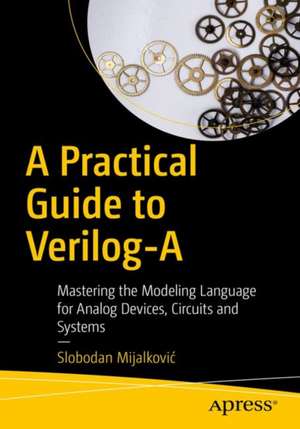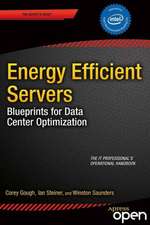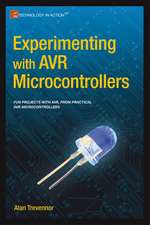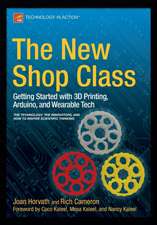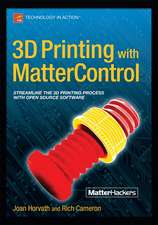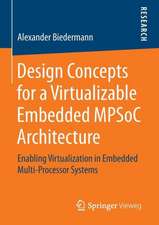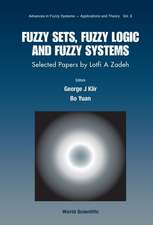A Practical Guide to Verilog-A: Mastering the Modeling Language for Analog Devices, Circuits, and Systems
Autor Slobodan Mijalkovićen Limba Engleză Paperback – 15 sep 2022
Discover how Verilog-A is particularly designed to describe behavior and connectivity of circuits and system components for analog SPICE-class simulators, or for continuous time (SPICE-based) kernels in Verilog-AMS simulators. With continuous updates since it’s release 30 years ago, this practical guide provides a comprehensive foundation and understanding to the modeling language in its most recent standard formulation.
With the introduction of language extensions to support compact device modeling, the Verilog-A has become today de facto standard language in the electronics industry for coding compact models of active and passive semiconductor devices. You'll gain an in depth look at how analog circuit simulators work, solving system equations, modeling of components from other physical domains, and modeling the same physical circuits and systems at various levels of detail and at different levels of abstraction.
All industry standard compact models released by Si2 Compact Model Coalition (CMC) as well as compact models of emerging nano-electronics devices released by New Era Electronic Devices and Systems (NEEDS) initiative are coded in Verilog-A. This book prepares you for the current trends in the neuromorphic computing, hardware customization for artificial intelligence applications as well as circuit design for internet of things (IOT) will only increase the need for analog simulation modeling and make Verilog-A even more important as a multi-domain component-oriented modeling language.
Let A Practical Guide to Verilog-A be the initial step in learning the extended mixed-signal Verilog-AMS hardware description language.
What You'll Learn
- Review the hardware description and modeling language Verilog-A in its most recent standard formulation.
- Code new compact models of active and passive semiconductor devices as well as new models for emerging circuit components from different physical disciplines.
- Extend the application of SPICE-like circuit simulators to non-electronics field (neuromorphic, thermal, mechanical, etc systems).
- Apply the initial steps towards the extended mixed-signal Verilog-AMS hardware description language.
Who This Book Is For
Electronic circuit designers and SPICE simulation model developers in academia and industry. Developers of electronic design automation (EDA) tools. Engineers, scientists and students of various disciplines using SPICE-like simulators for research and development.
Preț: 304.27 lei
Preț vechi: 380.33 lei
-20% Nou
Puncte Express: 456
Preț estimativ în valută:
58.22€ • 62.26$ • 48.54£
58.22€ • 62.26$ • 48.54£
Carte disponibilă
Livrare economică 28 martie-11 aprilie
Preluare comenzi: 021 569.72.76
Specificații
ISBN-13: 9781484263501
ISBN-10: 1484263502
Pagini: 300
Ilustrații: XXXV, 319 p. 26 illus.
Dimensiuni: 155 x 235 x 24 mm
Greutate: 0.5 kg
Ediția:1st ed.
Editura: Apress
Colecția Apress
Locul publicării:Berkeley, CA, United States
ISBN-10: 1484263502
Pagini: 300
Ilustrații: XXXV, 319 p. 26 illus.
Dimensiuni: 155 x 235 x 24 mm
Greutate: 0.5 kg
Ediția:1st ed.
Editura: Apress
Colecția Apress
Locul publicării:Berkeley, CA, United States
Cuprins
Chapter : Lexical Basis.- Chapter 2: Basic Types and Expressions.- Chapter 3: Nets Discipline Types.- Chapter 4: Modules and Ports.- Chapter 5: Parameters.- Chapter 6: Paramsets.- Chapter 7: Procedural Programming.- Chapter 8: Branches.-Chapter 9: Derivative and Integral Operators.- Chapter 10: Built-In Math Functions.- Chapter 11: User-Defined Functions.- Chapter 12: Look-Up Tables.- Chapter 13: Small Signal Functions.- Chapter 14: Filters.- Chapter 15: Events.- Chapter 16: Run Time Support.- Chapter 17: Input and Output.- Chapter 18: Generative Programming.- Chapter 19: Attributes.- Chapter 20: Compiler Directives.- Appendix A.
Notă biografică
Dr. Slobodan Mijalkovic is a Senior R&D Engineer at Silvaco, Inc., specialized in semiconductor device and integrated circuit modeling for electronic design automation (EDA) software tools. Before joining Silvaco Europe, he was a Principal Researcher in HiTeC Laboratory at Delft University of Technology in the Netherlands, where he led a team for standardization of the Mextram bipolar transistor model with Compact Model Coalition (CMC). Formerly, he was an Assistant and an Associate Professor with the Department of Microelectronics at Faculty of Electronics Engineering, University of Nis in Serbia (Yugoslavia).
Dr. Mijalkovic has authored 50 cited publications including the monograph “Multigrid Methods for Process Simulation” published by Springer. In the period 2002-2006 he has set and chaired four editions of “Compact Modeling for RF Application (CMRF)” workshops that strongly contributed to the acceptance of Verilog-A as a standard compact modeling language. He is a senior Member of IEEE and currently a member of the IEEE EDS Compact Modeling Committee.
Textul de pe ultima copertă
Discover how Verilog-A is particularly designed to describe behavior and connectivity of circuits and system components for analog SPICE-class simulators, or for continuous time (SPICE-based) kernels in Verilog-AMS simulators. With continuous updates since it’s release 30 years ago, this practical guide provides a comprehensive foundation and understanding to the modeling language in its most recent standard formulation.
With the introduction of language extensions to support compact device modeling, the Verilog-A has become today de facto standard language in the electronics industry for coding compact models of active and passive semiconductor devices. You'll gain an in depth look at how analog circuit simulators work, solving system equations, modeling of components from other physical domains, and modeling the same physical circuits and systems at various levels of detail and at different levels of abstraction.
All industry standard compact models released by Si2 Compact Model Coalition (CMC) as well as compact models of emerging nano-electronics devices released by New Era Electronic Devices and Systems (NEEDS) initiative are coded in Verilog-A. This book prepares you for the current trends in the neuromorphic computing, hardware customization for artificial intelligence applications as well as circuit design for internet of things (IOT) will only increase the need for analog simulation modeling and make Verilog-A even more important as a multi-domain component-oriented modeling language.
Let A Practical Guide to Verilog-A be the initial step in learning the extended mixed-signal Verilog-AMS hardware description language.
You will:
- Review the hardware description and modeling language Verilog-A in its most recent standard formulation.
- Code new compact models of active and passive semiconductor devices as well as new models for emerging circuit components from different physical disciplines.
- Extend the application of SPICE-like circuit simulators to non-electronics field (neuromorphic, thermal, mechanical, etc systems).
- Apply the initial steps towards the extended mixed-signal Verilog-AMS hardware description language.
Caracteristici
Master the latest Verilog-A language standard and understand the delineation from Verilog-AMS Develop a comprehensive understanding of Verilog-A as a multi-domain, component-oriented modeling language Understand the degrees of compatibility with SPICE-like simulators, and the approach taken to provide that compatibility
